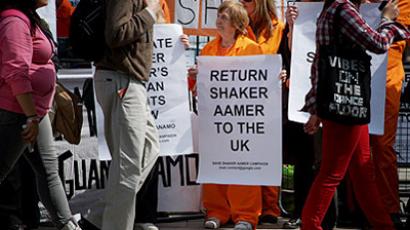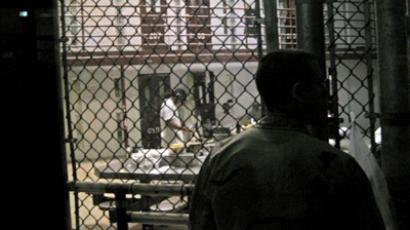Rights groups boycott UK torture probe over lack of integrity
An imminent British inquiry into its agents' use of torture overseas has been slammed before it has had a chance to get started.
It was revealed that Britain was prepared to use harsh interrogation methods if it considered the intelligence to be gained as valuable enough. However, the authorities are likely to withhold details of Britain’s policy on interrogation. That has led human rights groups to boycott the inquiry, saying it lacks credibility. Walking a tightrope of pain versus gain – it has emerged that that is how Britain’s security agencies were encouraged to decide when to torture terror suspects. Moazzam Begg was held at Bagram in Afghanistan and in Guantanamo Bay between 2002 and 2005. He says he was tortured, and accuses the UK of being complicit in that torture. Only now is the level of that official complicity being revealed.“I am completely, 100 per cent, sure that I would have not gone to Guantanamo or to Bagram had it not been for the involvement of the British Intelligence Service. I spoke to British Intelligence officers quite regularly in Bagram, Guantanamo and Kandahar – they were physically present when I was being abused, they saw my hands shackled behind my back, they saw my legs shackled, they saw guns pointed towards me, they saw hoods placed over my head,” Begg reveals. According to policy documents seen by the Guardian newspaper, senior MI5 and MI6 agents were asked to weigh up the quality of information they might obtain, with the level of mistreatment a prisoner would suffer – and if it was worth it, to go ahead. Amnesty International says there is a mounting pile of credible evidence on the extent to which Britain was involved in torture.“In [torture victim] Binyam Mohammed’s case, security service officials were sending questions, receiving information, participating in interrogations in situations where they even they knew or ought to have known that he was being tortured or mistreated. Diego Garcia was used for renditions flights. And every week or every month there is a new allegation, a new piece of evidence. There is another document that has been hidden for very long time, has just been released, shows that there were circumstances in which ministers or very senior officials authorized UK agents to participate in situations where it was more likely than not the torture would occur,” Amnesty International UK Policy Advisor Tara Lyle says. There is a police investigation into torture allegations underway, and as soon as that is finished, an inquiry will begin. But it has already come under fire – the policy on interrogation and other relevant documents may not be made public, which has angered human rights groups so much that they have refused to give evidence or go to inquiry meetings. There is also controversy about the chair of the investigation – Sir Peter Gibson used to be the intelligence services commissioner. The government does not see a conflict of interest there, but many MPs do.“I think there are a number of issues with the torture inquiry. The first thing is, we should have confidence the judge presiding is not somebody who has been heavily involved with [British] Secret service in the past. And I think on that point it fails,” John Hemming, British Liberal Democrat MP, says. Powerful people, including Tony Blair, Jack Straw and David Miliband, have refused to reveal whether they knew the policy led to a number of people being tortured. But the ministers and agents who wrote it knew the public would be outraged – according to the Guardian, it includes warnings that if it got out, the policy could lead to increased radicalization. Moazzam Begg agrees.“It is true that anybody would be radicalized when you hear the types of torture that took place. However when the government said that they would hold to account those people who were involved in torture, we take them for their word and if the government then goes against it and says we will have this session about complicity in torture but it is going to be in secret and you will not get to see it, and will not get to see those people who are involved your torture, then people will lose any support, any idea that the government will actually carry out justice,” he said.Many fear the enquiry set to begin shortly will be ineffective and that a second one will be necessary, at vast expense; but there is also concern that creeping revelations about just how complicit the UK has been in torture and extraordinary rendition will lead to further radicalization. Whatever happens, it is clear people have not heard the last of Britain’s involvement in torture.














